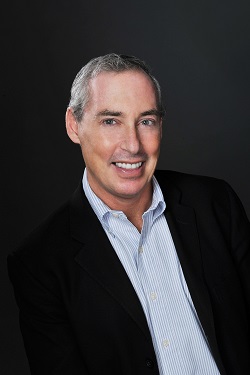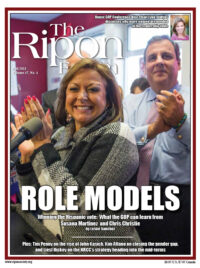
In any stadium, the loudest voices are in the bleachers. Therefore it’s only natural that most politicians set up in the end zones, closest to their parties’ most ideologically driven fans but a hundred yards away from the other team. In politics, though, unlike football, the work gets done and accomplishments happen in the space between the forty-yard lines. And in recent years, the political space closest to midfield has become increasingly deserted.
The result is polarized and hyper-partisan politics and governmental gridlock, where the two parties point fingers and hurl epithets at each other, but are less and less likely to work together to solve problems of mutual concern. Not surprisingly, voters become increasingly disenchanted with their elected leaders. Popular support for Congress dropped to nine percent in November polling.
The Republicans’ difficulties are more apparent. Increasing numbers of business leaders, whose economic interests have historically aligned them with the G.O.P., are viewing the government shutdown agenda of the party’s most conservative members with alarm. And an electorate that is much less white, much less religious, much less straight and much less old creates even greater challenges for Republicans going forward. But the Obamacare debacle has diminished Democrats’ standing with voters as well, and now both party’s leaders seem to have decided that being the most popular 8-track tape store at the local shopping mall is an adequate replacement for a long-term electoral strategy.
But there are remedies at hand, and the state of California, which for years has been the nation’s poster child for dysfunctional governance, is demonstrating that small but important changes in the rules governing elections can have a marked impact on the candidate who run under those rules once they’ve taken office.
The state of California… is demonstrating that small but important changes in the rules governing elections can have a marked impact on the candidates who run under those rules once they’ve taken office.
The two most important changes that we’ve implemented in the Golden State are reform of the manner in which our legislative and congressional districts were drawn and the implementation of a top-two primary. Taking the redistricting process away from the state legislature has led to the creation of genuinely competitive congressional and legislative districts. Meanwhile, the top-two primary creates an incentive for candidates in strongly liberal or conservative districts to talk to voters in both parties rather than relying solely on the most ideologically extreme members of their own party for support.
Under the old rules, those that are still in place in most states across the country, a politician in either party could be confident that there was almost no possible way that he could ever lose a general election campaign in a gerrymandered district. The only way he could ever lose his job, therefore, was in a primary contest to an even more ideologically extreme member of his own party.
Our elected representatives learned very quickly that these seats were theirs for life that they could lie, cheat or steal and still be assured of re-election. The only action for which there was no forgiveness would be compromise, or looking for opportunities to cooperate with members of the opposing party. That instinct would quickly be punished by a primary opponent backed by Moveon.org or the Tea Party. Even those officeholders who might be inclined to work across party lines on occasion had a powerful disincentive not to do so.
But the combination of redistricting reform and a top-two primary has reversed this incentive system. The result has been to dramatically improve the prospects for not only centrists of either party, but principled conservatives and liberals as well who demonstrate an interest and ability to cooperate across party lines. Under California’s new rules, politicians who reach out across the aisle are less exposed to pressure from their own party’s base, because that pressure can be mitigated with increased support from independent voters or centrists of the other party. Conversely, candidates who won their campaigns by attracting support from voters of other parties would be more likely to seek out opportunities to cooperate across partisan boundaries after taking office.
This past year we saw politicians of both parties finding ways to work across traditional partisan boundaries.
The predictable partisan voices fought hard against the new redistricting and primary rules. But the combination of these two essential changes has been to reorient legislators from a single-minded focus on the ideological extremes within their own parties to a broader awareness of the priorities of larger swaths of the electorate. Because it has become much more difficult for candidates to rely solely on their party bases to win election, they have begun to look for opportunities for bi-partisan cooperation. This past year we saw politicians of both parties finding ways to work across traditional partisan boundaries. Several Republican legislators advocated for immigration reform and many of their Democratic counterparts voted for environmental deregulation.
These reforms do not magically overcome a state’s political, governmental and policy challenges: all they could do is create opportunities for smart men and women to work together to solve them. As has been the case with many other policy and political reforms in the past, California is once again poised to lead the way in creating a more cohesive and productive means of governance.
Dan Schnur is the director of the Jesse M. Unruh Institute of Politics at the University of Southern California. He was the national communications director for the 2000 presidential campaign of U.S. Senator John McCain.




